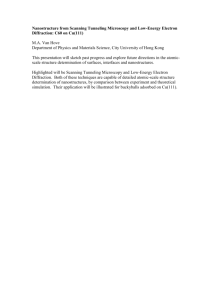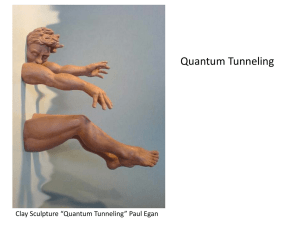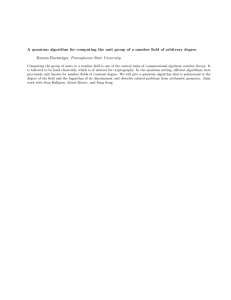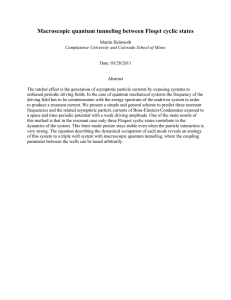SYLLABUS EE 599-003
advertisement
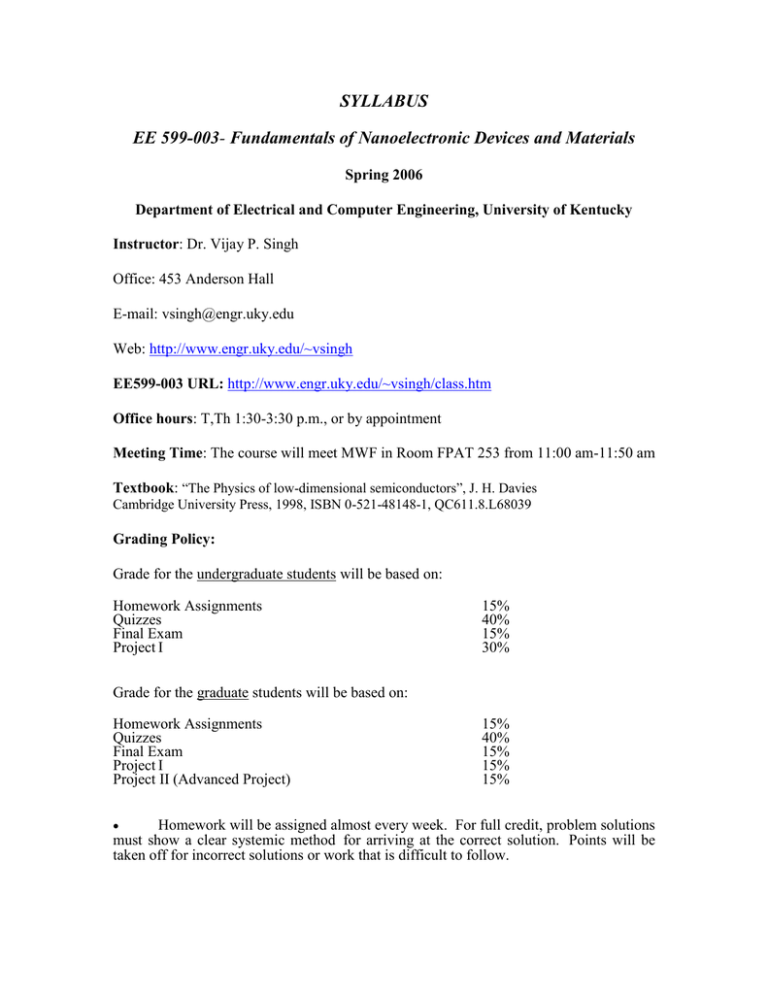
SYLLABUS EE 599-003- Fundamentals of Nanoelectronic Devices and Materials Spring 2006 Department of Electrical and Computer Engineering, University of Kentucky Instructor: Dr. Vijay P. Singh Office: 453 Anderson Hall E-mail: vsingh@engr.uky.edu Web: http://www.engr.uky.edu/~vsingh EE599-003 URL: http://www.engr.uky.edu/~vsingh/class.htm Office hours: T,Th 1:30-3:30 p.m., or by appointment Meeting Time: The course will meet MWF in Room FPAT 253 from 11:00 am-11:50 am Textbook: “The Physics of low-dimensional semiconductors”, J. H. Davies Cambridge University Press, 1998, ISBN 0-521-48148-1, QC611.8.L68039 Grading Policy: Grade for the undergraduate students will be based on: Homework Assignments Quizzes Final Exam Project I 15% 40% 15% 30% Grade for the graduate students will be based on: Homework Assignments Quizzes Final Exam Project I Project II (Advanced Project) 15% 40% 15% 15% 15% Homework will be assigned almost every week. For full credit, problem solutions must show a clear systemic method for arriving at the correct solution. Points will be taken off for incorrect solutions or work that is difficult to follow. Failure to take an exam during the assigned class period will result in a grade of zero for that test. In such a case, student should see the instructor to explain the circumstances. The student is responsible for all business conducted during any scheduled class period. Any revision to the test dates, homework assignments, etc. will be announced during the class period. The detected use of unethical tactics on a quiz, test, or homework will result in an E for the course. This includes copying another person's work, or making your work available for others to copy. Appropriate actions will be taken in accordance with the university policies on cheating and plagiarism. The student is expected to read the text and is responsible for all material in the reading assignments. The sections of the text should be read prior to the class meetings covering the material. Course Topics I. Foundations; Wave mechanics and the Schrodinger Equation; Free Particles; Bound Particles; Charge and current densities II. Heterostructures: General properties of heterostructures; Growth of heterostructures; Band engineering; Quantum wells, Superlattices and Silicon-Germanium heterostructures; Quantum dots and wires; Optical confinement III. Transmission in nanostructures: Tunneling; Tunneling in heterostructures;Transmission matrices (T- matrices); Resonant tunneling; Tunneling transport; Current and conductance in one dimension; Current in two and three dimensions; Quantized conductance in nanostructures (4 weeks) IV. Fundamentals of Nano-Scale Engineering for Photonics applications: Three-dimensional nanostructures with electron and photon confinement; Quantum wires and quantum dots for optoelectronics; Quantum dot lasers. V. Current Topics in Nanoscale Devices: Solar cells, display devices, sensors and other devices of interest. Course Outcomes Upon completion of the course, the student will be have: 1. the basic understanding of the behaviour of electrons in semiconductor crystals, Schrodinger equation; energy levels and bands and charge and current densities 2. the basic understanding of heterostructures; band engineering; quantum wells, superlattices and quantum dots and wires. 3. the basic understanding of electron transport in in nanostructures, tunneling; resonant tunneling and quantized conductance in nanostructures. Homework policy: Homework will generally be assigned each week. The homework assignments will be distributed in the Class and/or Web. The homework is to be turned in at the beginning of the class period. No late homework will be accepted. Attendance: If a student is to be absent from class for an extended period of time (two classes or more), the Instructor must be notified in advance, if possible, or by the second class of the absence. Final Exam: Any student having a legal conflict on that exam day will need to notify the instructor no later than the last week of classes. Anyone failing to notify the instructor before this time will have to take the exam during the scheduled time. Grading Assignment will be based on your final score for the course based on the homework, midterm exams, project and final exam, as outlined above. The letter grade assignment will then be calculated according to the table below. Final Grade Letter Grade 86-100 % A 46-85% B,C,D Below 45% E
